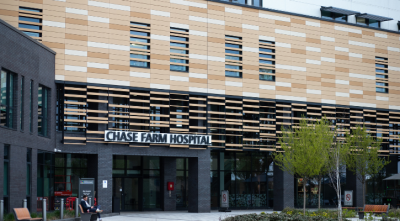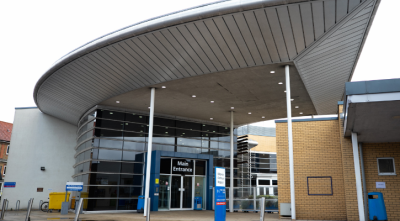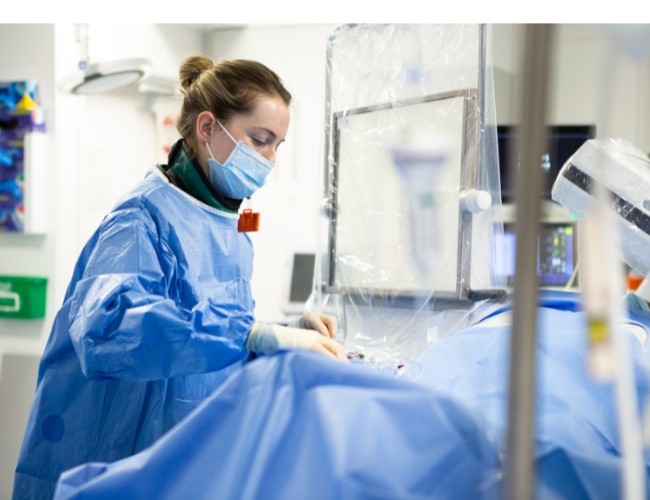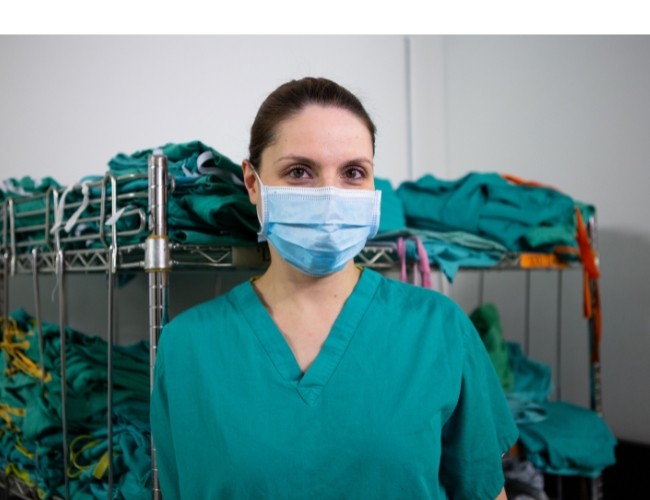Our cardiology department provides a comprehensive range of general and specialist heart services. It provides inpatient care at its hospital sites, as well as community and outpatient care across north central London.
We are a national referral centre for a number of rare heart diseases, including pulmonary hypertension, carcinoid heart disease, amyloidosis and glycogen storage disorders.
The Royal Free Hospital is a campus of the University College London Medical School. The cardiology department undertakes a large amount of research, and takes part in key national and international heart studies.
Barnet Hospital
Patient and GP enquiries: 020 3758 2069
Cardiology admissions coordinator: 020 3758 2069
Cardiology day ward: 020 8216 4618
Diagnostic GP referrals and results: rf-tr.
Secretaries: rf-tr.
Chase Farm Hospital
Patient and GP enquiries: 020 3758 2069
Secretaries: rf-tr.
Diagnostic GP referrals and results: rf-tr.
Royal Free Hospital
Diagnostic internal referrals and results: rf-tr.
Diagnostic GP referrals and results: rf-tr.
Patient and GP enquiries: 020 3758 2069
Cardiology admissions coordinator: 020 3758 2069
Cardiology day ward: 020 3758 2069
Royal Free secretaries: rf.
Edgware Community Hospital
Enquiries: 020 3758 2069
Secretaries: rf-tr.
Diagnostic GP referrals and results: rf-tr.
Finchley Memorial Hospital
Finchley booking office: 020 7317 7717
Admin. office: 020 7794 0500 ext 27412
Finchley ECHO physiologist: 020 7794 0500 ext 27404
Finchley tape physiologist: 020 7794 0500 ext: 27405
There is a fully integrated cardiology department at Barnet Hospital, with the majority of our doctors working across the Royal Free Hospital and Barnet Hospital. This ensures standardisation of practice.
Barnet Hospital has a seven-bed coronary care unit (CCU) and a dedicated cardiac ward (Rowan), with separate areas for men and women.
There is a cardiac investigation unit (CIU) offering non-invasive cardiac imaging, outpatient diagnostics (such as Holter heart monitors and blood pressure monitors) and pacemaker services.
There is also a nuclear cardiology service which undertakes a large volume of functional, nuclear perfusion scans each year.
The cardiac rhythm management (CRM) service is based at Barnet Hospital. This includes outpatient clinics and pacemaker interrogation and programming.
All invasive CRM procedures are undertaken at the hospital's cath lab, including insertion of permanent pacemaker systems, complex devices including cardiac defibrillators and cardiac resynchronisation therapy (CRT), and electrophysiology diagnostics and ablation.
There is a large heart failure service based at the hospital, including a team of clinical nurse specialists who run clinics and manage patients on the ward.
A ‘virtual ward’ has also been introduced for heart failure patients, whereby patients are monitored remotely to enable them to be either discharged early from the ward, or avoid coming into hospital at all.
There is a cardiac rehabilitation team based at the hospital, which works with patients who have had a heart attack or have undergone cardiac surgery, helping them build up levels of exercise and confidence following their illness.
Chase Farm Hospital is a key outpatient hub for our service in Enfield.
A large range of cardiology clinics and outpatient services are run from the hospital, including a cardiac investigation unit (CIU) which undertakes echocardiography and other diagnostics and pacemaker programming.
It is also the site for other one-stop services including rapid access chest pain and heart failure.
Cardiac rehabilitation services are also located at Chase Farm Hospital.
The cardiology unit at the Royal Free Hospital comprises a seven-bed coronary care unit (CCU) and a designated cardiology ward (20 beds).
There is a dedicated diagnostic department providing a full range of non-invasive investigations, two cardiac catheter laboratories and a day case coronary interventional unit (10 beds).
The Royal Free Hospital is one of London’s seven dedicated heart attack centres, providing 24/7 on-call emergency services for patients who have had a heart attack.
It has the largest standalone percutaneous coronary intervention (PCI) site in London. It carries out around 1,500 invasive procedures per year, including diagnostic angiography and stenting of blocked coronary arteries.
Patients at the Royal Free Hospital have access to state-of-the-art technologies, including advanced intra-coronary imaging and adjunctive therapies — these include ‘shock-wave’ therapy for heavily calcified and diseased vessels, which helps make treatment effective and achieve the best possible results.
Patients who attend as day cases are treated in a dedicated day interventional unit, which includes a lounge to encourage patients to move around after their procedure.
There is a large cardiac imaging facility, providing access to the latest technology and a wide range of different diagnosis and treatment options, including 3D echocardiography, transesophageal echo, cardiac MRI (magnetic resonance imaging), cardiac CT (computerised tomography) and nuclear perfusion imaging.
There are a number of specialist cardiology clinics available:
- rapid access chest pain
- pulmonary hypertension
- resistant hypertension
- one-stop valvular heart disease
- heart failure
- carcinoid heart disease
- obstetric cardiology
- adult congenital cardiology
- cardiology psychology service
There is also a nurse-led acute chest pain service and a cardiac rehabilitation programme, which helps patients who have suffered a heart attack or undergone cardiac surgery to build up levels of exercise and confidence following their illness.
Finchley Memorial Hospital has been developed as a community diagnostic centre as part of NHS England’s drive to expand the availability of diagnostic tests.
The service includes a range of outpatient diagnostic tests, including echocardiography, Holter heart monitors and blood pressure monitors.
There are also one-stop community clinics at the hospital, where patients can have their test and see a hospital consultant on the same day, to speed up time to diagnosis and treatment.
Referrals to the cardiology team can be made via a GP or hospital doctor. Patients cannot be seen without an appointment.
Electronic referrals from a GP are made through the NHS e-Referral Service. Tertiary referrals (from other hospital consultants) are also available.
A referral from your GP will not automatically lead to an outpatient appointment at one of our hospitals. Referrals to the cardiology team are reviewed by a clinician and then one of the following happens:
- You will receive an outpatient appointment at one of our hospitals.
- You will receive an appointment for a test or an investigation before your first outpatient appointment.
- You and your GP will receive a letter explaining how best to manage your symptoms. This is if one of our clinicians has reviewed your symptoms and does not think you need to attend an outpatient appointment.
More information about what to expect when you are referred to the Royal Free London can be found on our outpatient page.
If you have any questions about your referral, please email rf.
 Translate
Translate










